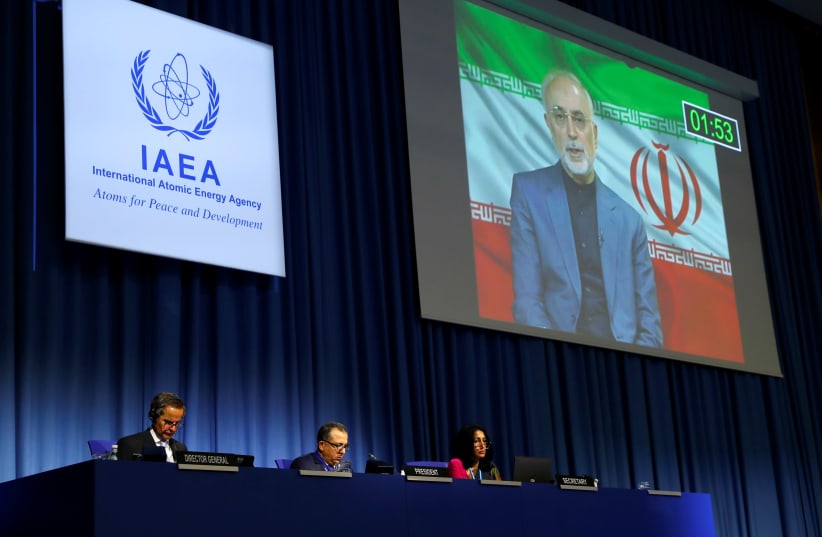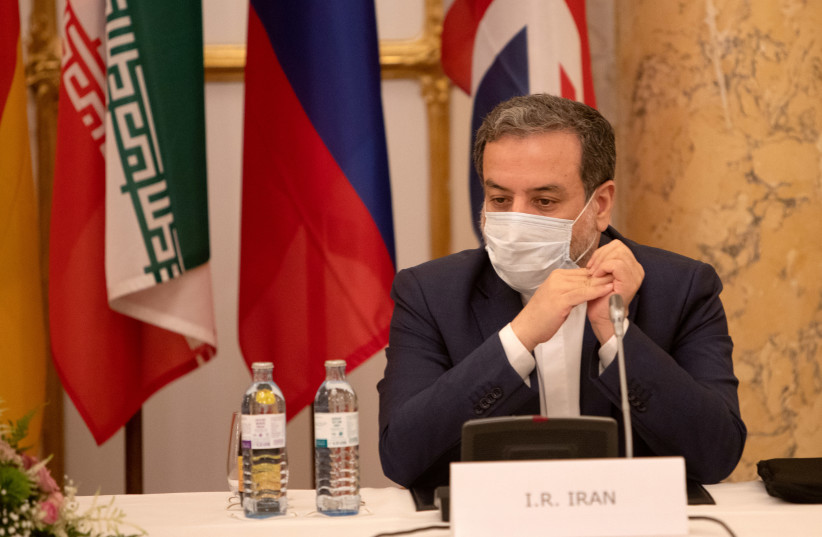In a move that could revive negotiations to restore the Iran nuclear deal, Tehran’s nuclear agency and the International Atomic Energy Agency reached an agreement on Sunday allowing the IAEA to service its monitoring equipment.
“IAEA’s inspectors are permitted to service the identified equipment and replace their storage media, which will be kept under the joint IAEA and [Atomic Energy Organization of the Islamic Republic of Iran] seals in the Islamic Republic of Iran,” read a joint statement of the two agencies. “The way and the timing are agreed by the two sides.”
The media being kept under seal in Iran means the IAEA will not actually have access to the data that its equipment gathered.
The UN nuclear watchdog’s Director-General Rafael Grossi was in Tehran on Sunday, days after his agency released a report rapping Iran for continuing to stonewall the IAEA’s inquiry into nuclear materials found at undeclared sites.
The US and Germany, France and the UK – known as the E3 – considered pushing an IAEA resolution condemning Iran at the agency’s next Board of Governor’s meeting, which begins on Monday.
Iran, however, obliquely threatened to leave negotiations to return to the 2015 Joint Comprehensive Plan of Action nuclear agreement, if the US and E3 do so. Iran has refused to continue the talks, which began in April, since early June, and has not committed to returning to them.
Grossi negotiated with Iran ahead of the trip to allow the IAEA access to its monitoring equipment, offering for the E3 and the US to scupper its resolution in return, according to The Wall Street Journal.
The statement Grossi and Iranian Vice President and AEOI head Mohammad Eslami released on Sunday does not mention any commitments by the Western states, or the JCPOA talks at all.
Rather, it said that Grossi plans to visit Tehran again for high-level meetings in the near future.
In addition, according to the statement, the meeting “reaffirmed the spirit of cooperation and mutual trust and its continuation, and emphasized the necessity of addressing the relevant issues in a constructive atmosphere and exclusively in a technical manner.”
The US left the Iran deal, which restricted the Islamic Republic’s nuclear program until 2030 in exchange for the lifting of sanctions, in 2018, opting for a “maximum pressure” sanctions campaign, instead. US President Joe Biden has promised to return to the deal. In the interim, Iran has continually blocked IAEA access to undeclared nuclear sites, increased its uranium enrichment up to 60% and developed uranium metal.
EU Political Director Enrique Mora, who represents the EU in the Vienna talks, called the agreement “a positive step toward ensuring continuity of knowledge on Iran’s nuclear program. Gives space for diplomacy,” he tweeted. “EU’s aim remains full JCPOA implementation by all. For that it’s crucial we resume Vienna Talks as soon as possible.”
Russian Ambassador to International Organizations in Vienna Mikhail Ulyanov tweeted in response: “Pleased to note that on these points Russia and EU are like-minded... We call for an earliest resumption of Vienna Talks on restoration of JCPOA.”
Last week’s IAEA report states that a year after its previous report rapping Iran for its obstructionism, “Iran has still not provided the necessary explanations for the presence of the nuclear material particles at any of the three locations… where the Agency has conducted complementary accesses.”
Furthermore, the report says, “the lack of progress in clarifying the Agency’s questions concerning the correctness and completeness of Iran’s safeguards declarations seriously affects the ability of the Agency to provide assurance of the peaceful nature of Iran’s nuclear program.”
The nonproliferation think tank Institute for Science and International Security released an analysis of the IAEA report, which concluded that the return to the JCPOA would signal that the deal’s temporary limits – which are much less effective in light of Iran’s advances – are more important to the US and E3 than stopping the erosion of the IAEA’s authority or preventing Iran from getting a bomb in the long term.
“World leaders, in essence, would choose convenience rather than doing the difficult but critical work to determine if Iran’s nuclear program is peaceful,” the report states.

